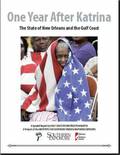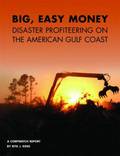Menu

More than a hurricane: the Katrina disaster began on August 29, 2005
For too many it is still going on. A number of groups are working for a just, fair reconstruction of people’s lives, homes and cities. Here are some key resources and websites, featuring work by and about women, who were especially affected by the storm, racism, official neglect and “disaster profiteering.” Women have also been taking action…
Gulf Coast Reconstruction Watch has published "One Year after Katrina" (pdf), a 96-page report that reveals the state of Gulf Coast rebuilding on the anniversary of the storm. Through statistics, status reports, in-depth investigations, and profiles of community leaders, "One Year After Katrina" highlights the challenges ahead for a just and sustainable renewal.
Big, Easy Money
Disaster Profiteering on the American Gulf Coast
Disaster profiteers make millions while local companies and laborers in New Orleans and the rest of the Katrina-devastated Gulf Coast region are systematically getting the short end of the stick, according to a major new report from the nonprofit CorpWatch.
…“Big, Easy Money” report author Rita J. King said: "The devastation of the Gulf Coast is tragic enough, but the scope of the corporate greed that followed, facilitated by government incompetence and complicity, is downright criminal. Sadly, disaster profiteering has become commonplace in America. Well connected corporations are growing rich off of no-bid contracts while the sub-contractors - the people who actually perform the work - often do so for peanuts, if they get paid at all."
Click here to read the report (text version), to see key findings.
A Place for Women After Katrina
Elena Everett interviews Shana Griffin, resident of New Orleans and organizer with INCITE: Women of Color Against Violence and Critical Resistance New Orleans.
“One of the biggest post-Katrina challenges is the complete absence of consideration or special provisions to meet the needs of women. So many studies related to disaster or times of war and conflict show that women are one of the most vulnerable populations. Violence against women increases as well as their responsibilities, since they are generally the primary caregivers for the elderly and children. There’s been an invisibility [of] the needs of women of color in the Gulf Coast region…”
Stories of Women’s Hope, Activism and Leadership across the Gulf Coast
NEW YORK - August 30 - Women are building houses and communities, sheltering the homeless and preventing domestic violence, and advocating for policies and approaches that improve life in the areas devastated by Hurricanes Katrina and Rita, with help from the Ms. Foundation for Women. Now, these women’s personal stories of triumph and tragedy are available for viewing on the Ms. Foundation web site: http://www.ms.foundation.org/wmspage.cfm?parm1=368
Take Action For Real Relief. A Just Recovery. And Nothing Less.
For information and actions to take: http://www.katrinaaction.org/
The Crosspoint: making connections against racism and discrimination
Racism was a big issue in New Orleans, and still is. As we researched we found an interesting website with links to more than 2000 anti-racism, human rights and support organizations in 114 countries.
See also antiracismnet:
http://www.antiracismnet.org/main.html



